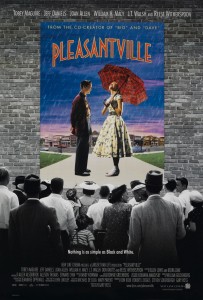Gary Ross (Writer and Director) 1998
My students often find it hard to believe that I am not much of a reader. Well, I tend not to read a huge amount beyond work. The fact is most reading just feels like… work. Eventually Literature students discover that once you master ‘literaturing’ things (they have turned the noun into a verb without any approval or guidance from me) it can be very hard to turn this super power off. I deconstruct the instructions on a teabag and explore the dialogic relationship to the instructions on the artificial sweetener. It is an affliction of sorts. It is a common film trope that when someone develops telepathy they become overwhelmed with the voices of everyone around them, it is deafening. The same is true with the power of interpretation. This is my origin story.
Prior to my days as a Literature teacher, long before I had taught VCE, I found myself having to teach a film as text to a group of Year 9 students. I love film. All of my English studies at university were based on film. I even once wrote a comparison between Bram Stoker’s Dracula and Eddie Murphy’s Vampire in Brooklyn without a hint of irony. Film holds so much meaning and power. Its accessibility fools the audience into considering complex ideas while just looking to escape the summer heat or inhale a box of popcorn. Vampire in Brooklyn may not have had a deeper meaning on reflection but the film I chose for my Year 9 students in 2007 was like striking a rich seam of gold in soft loamy soil. It turned me from a Legal Studies teacher who also taught English into a die-hard post-structuralist.
Many haven’t seen Pleasantville but are vaguely aware of it. It has been on TV a lot. I think this is because it seems relatively innocuous. The tale of a brother and sister pulled into a 1950s family program similar to Leave It To Beaver, it seems wholesome and something the family can watch and not be offended by. The 50s are safe right? Wally and the Beav’ never dropped the F bomb after all. But one weekend I started to ‘literature’ the film. I ended up breaking down every scene, working through it and finding the hidden meanings and suggestive symbols. A few months later, taking it into class, the students’ jaws drop when the 1950s mother masturbates while enjoying a bath, they then they scream ‘ewwww’ when I explain that the tree that suddenly caught fire outside the window is her orgasm and they nearly walk out of the room when I point out that her son, operating the fire hose that extinguishes the flame, is engaged in a fairly Oedipal moment (I have to explain Oedipus as well which causes some to gouge out their own eyes).
Now, if you haven’t seen the film I should explain. It isn’t all masturbation and phallic imagery… not all of it. A brother and sister from the 1990s are sucked into the world of a seemingly idyllic 50s sitcom when handed a slightly odd looking remote control by a suspicious looking TV repair man. The male lead, Tobey Maguire pre-Spiderman, is enamoured of the program and doesn’t want to change it. His sister, Reese Witherspoon, is keen to take advantage of the naivety of the handsome boys of the town unfamiliar with sex. This black and white world gradually takes on colour as the fictional characters develop personality and find freedom from both the 50’s expectations and their hollow lives. The scene that makes the film is the moment when the fear of the men and older folk, who are losing their entitlement and control, clashes with the desire of the teenagers and the women to continue their liberation. It acts as a parallel of the civil rights movement, the gender revolution and the rise of the left.
I like to think I moved Year 9 students from being conformists to seeing the potential to reinvent their worlds and challenge the existing structures that they had to work within. Tobey Maguire sticks it to the man and encourages the viewer, in a wonderful homage to To Kill A Mockingbird, to also take a stand and not accept conformity. Revolution is the way. I’m not sure it really affected the students but the film acted as a revolution for me. It took me six hours to work through the film scene by scene with the students. What I unleashed was an interpretation genie. I let loose a deconstruction daemon and have not looked back. I shall never again hear Brubeck’s Take Five and not be whisked back to that classroom where I realised that teaching film, Literature and pulling text apart was who I was.
If you have only seen snippets of Pleasantville as it screened on a Sunday arvo, run down to the shops, pick up a copy and sit back and let it inspire you. I have always had blue eyes but after watching the film it was like they were really blue, like blue blue.



Pingback: Pleasantville – A Review | Mr Young's Blog